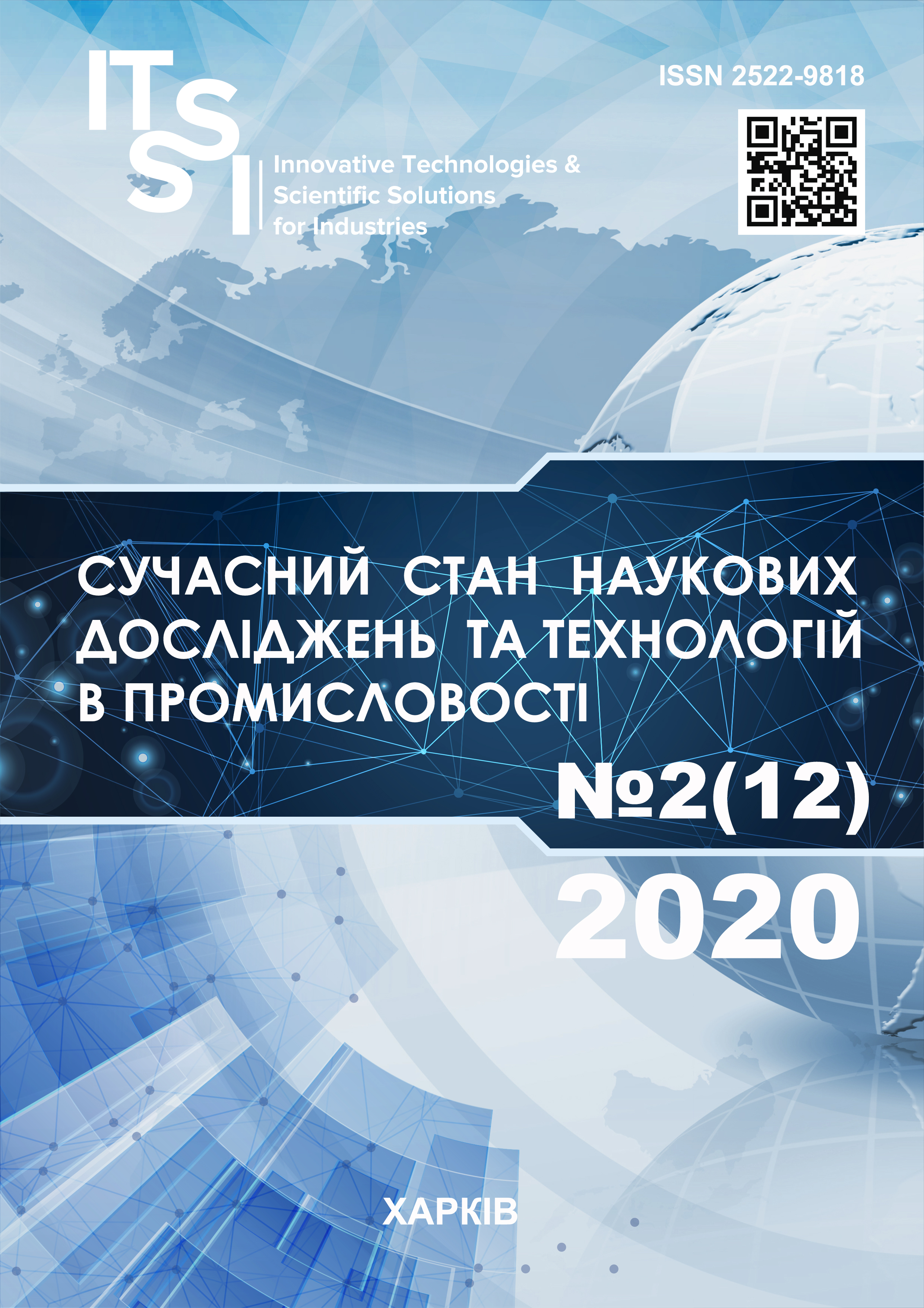ЕНЕРГОЕНТРОПІЙНА ЦІННІСТЬ РЕСУРСІВ ОРГАНІЗАЦІЇ
DOI:
https://doi.org/10.30837/2522-9818.2020.12.005Ключові слова:
ентропія, енергообіг, ресурси, цінність, організаціяАнотація
Предметом дослідження є підходи і методи визначення енергетичної та ентропійної цінності ресурсів організації. Метою даного дослідження є розробка концепції та відповідного математичного інструментарію визначення та аналізу динаміки енергоентропійної цінності ресурсів організації. Для досягнення поставленої мети необхідно виконати наступні завдання: визначити вираз енергоентропії, сформулювати модель енергообігу організації, розробити систему показників, що дозволяють визначати ентропійну цінність ресурсів організації. Використовуються такі методи: системний аналіз, теорія ймовірності, енергоентропійна теорія. Результати. В результаті дослідження встановлено, що в процесі діяльності організації виникає колообіг протоенергії і енергії: енергія - протоенергія (ресурси) - протоенергія (продукт) - енергія. Встановлено співвідношення між вхідною та вихідною енергією організації, що дозволило узагальнити поняття "ефективність" в рамках енергоентропійного підходу. На відміну від класичної ефективності, запропоновано альтернативною мірою "ефективної організації системи" вважати ентропію. Виходячи з цього, цінність ресурсів організації формується з двох складових - енергетичної та ентропійної. В рамках енергоентропійної концепції організації і розглянутого енергообігу, енергетична цінність ресурсів визначена як співвідношення вхідної та вихідної енергії організації за певний проміжок часу. У такій інтерпретації енергетична цінність ресурсів організації є своєрідним аналогом ефективності. Встановлено, що цінність ресурсів може розглядатися як інтегрально, так і для кожного виду ресурсу окремо. Також в роботі запропоновані показники, що відображають ентропійну цінність ресурсів в грошовому еквіваленті. Висновки. В даному дослідженні категорія «цінність ресурсів організації» розглянута в рамках енергоентропійної концепції організації. Сформульовано модель енергообігу організації і розглянута цінність організації з позиції енергоефективності та енергоентропії. Розроблено систему показників, що дозволяє в комплексі оцінювати ентропійну цінність кожного ресурсу окремо і їх сумарну цінність. Також запропонований інструмент аналізу динаміки енергоентропії і обґрунтований відносний показник динаміки ентропій, який комплексно оцінює структурні і якісні зміни в організації і дозволяє виділити проблеми енергетично-організаційного характеру, які потребують вирішення.
Посилання
Alekseev, G. N. (1983), Energyentropics [Energoentropika], Moscow, Knowledge, 268 p.
Bushuyev, S., Sochnev, S. (1999), "Entropy measurement as a project control tool", International Journal of Project Management, No. 17 (6), P. 343–350.
Petrenko, A. V. "Organization management as a struggle with entropy" ["Upravleniye organizatsiyey kak bor'ba s entropiyey"], Institutional repository of the National Aviation University of Ukraine, available at: www.er.nau.edu.ua/bitstream/NAU/14626/1/Entropy
Yagelskaya, E. Yu. (2013), "The essence and structure of economic energy" ["Sushchnost' i struktura ekonomicheskoy energii"], Problems of Economics and Management, No. 8 (24), P. 98–111.
Lіkhonosova, G. S. (2018), "Entropy balancing: a tool for eliminating socio-economic exclusion at the enterprise" ["Entropy balance: the instrument for the consolidation of social and economic vodtorgneny"], Chronicle of economic reforms, No. 2, P. 43–51.
Melnik, L. G. (2013), "Analysis of the energy-entropic prerequisites for the progressive development of economic systems" ["Analiz energoentropiynykh predposylok progressivnogo razvitiya ekonomicheskikh system"], Actual problems of economics, No. 10, P. 15–22.
Bushuyev, S. D., Yaroshenko F., Yaroshenko N. (2013), "Entrepreneurial energy in the management of development projects" ["Predprinimatel'skaya energiya v upravlenii proyektami razvitiya"], Project management and production development, No. 2, Р. 5–12.
Shakhov, A. V. (2014), "Entropy model of portfolio management of a project-oriented organization" ["Entropiynaya model' portfel'nogo upravleniya proyektno-oriyentirovannoy organizatsiyey"], Project Management and Development of Network, No. 2, P. 87–95.
Ceptureanu, E. G., Ceptureanu, S. I., Popescu, D. I. (2017), "Relationship between Entropy, Corporate Entrepreneurship and Organizational Capabilities in Romanian Medium Sized Enterprises", Entropy, No. 19, P. 412. DOI: https://doi.org/10.3390/e19080412
Chen, Jing (2002), "An Entropy Theory of Value", SSRN Electronic Journal, available at: https://www.researchgate.net/publication/228398386_An_Entropy_Theory_of_Value
Bondar, A., Bushuyev, S., Onyshchenko, S., Hiroshi, H. (2020), "Entropy Paradigm of Project-Oriented Organizations Management", Proceedings of the 1st International Workshop IT Project Management (ITPM 2020) Volume 1. Lviv, Ukraine, February 18-20, 2020, CEUR Workshop Proceedings (CEUR-WS.org), P. 233–243, available at: http://ceur-ws.org/Vol-2565/paper20.pdf
Bondar, A. V. (2019), "The concept of the human resources value of a project-oriented organization", Proceedings of Admiral Makarov NUS, Helvetik Publishing House, No. 1, P. 135–141. DOI: https://doi.org/10.15589/znp2019.1(475).19
Bondar, A. (2020), "Management of human resources of the project-oriented organization based on the profile of the specialist and the degree of its uniqueness", Innovative Technologies and Scientific Solutions for Industries, No. 1 (11), P. 28–34. DOI: https://doi.org/10.30837/2522-9818.2020.11.028.
Bondar, A. V., Onishchenko, S. P. (2019), "Optimization of project time parameters", Managing the development of folding systems, No. 39, P. 11–18. DOI: https://doi.org/10.6084/M9.FIGSHARE.11340629.V1
Onyshсhenko, S., Bondar, A., Andrievska, V., Sudnyk, N., Lohinov, O. (2019), "Constructing and exploring the model to form the road map of enterprise development", Eastern-European Journal of Enterprise Technologies, Vol. 5, No. 3 (101), P. 33–42. DOI: https://doi.org/10.15587/1729-4061.2019.179185
Onyshchenko, S., Leontieva A. (2018), "Modeling of the optimal composition of the enterprise technical development program", Technology audit and production reserves, No. 5 (2), P. 36-41. DOI: https://doi.org/10.15587/2312-8372.2018.146463
##submission.downloads##
Опубліковано
Як цитувати
Номер
Розділ
Ліцензія
Авторське право (c) 2020 Alla Bondar

Ця робота ліцензується відповідно до Creative Commons Attribution-NonCommercial-ShareAlike 4.0 International License.
Наше видання використовує положення про авторські права Creative Commons для журналів відкритого доступу.
Автори, які публікуються у цьому журналі, погоджуються з наступними умовами:
Автори залишають за собою право на авторство своєї роботи та передають журналу право першої публікації цієї роботи на умовах ліцензії Creative Commons Attribution-NonCommercial-ShareAlike 4.0 International License (CC BY-NC-SA 4.0), котра дозволяє іншим особам вільно розповсюджувати опубліковану роботу з обов'язковим посиланням на авторів оригінальної роботи та першу публікацію роботи у цьому журналі.
Автори мають право укладати самостійні додаткові угоди щодо не комерційного та не ексклюзивного розповсюдження роботи у тому вигляді, в якому вона була опублікована цим журналом (наприклад, розміщувати роботу в електронному сховищі установи або публікувати у складі монографії), за умови збереження посилання на першу публікацію роботи у цьому журналі.
Політика журналу дозволяє і заохочує розміщення авторами в мережі Інтернет (наприклад, у сховищах установ або на особистих веб-сайтах) рукопису опублікованої роботи, оскільки це сприяє виникненню продуктивної наукової дискусії та позитивно позначається на оперативності та динаміці цитування опублікованої роботи.














